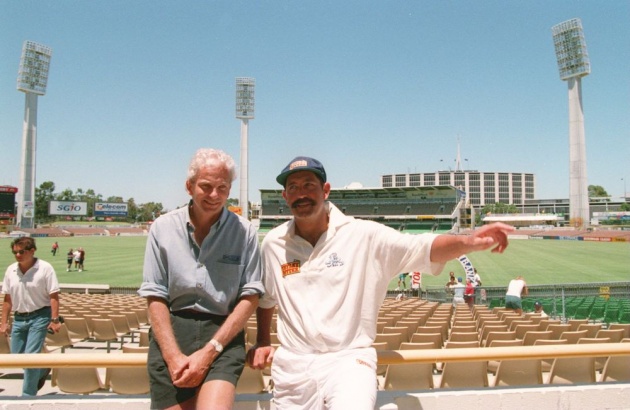In cricket as in life, we favour sharp drama and narratives of redemption, doing the Stewarts and the Gooches of the world a disservice

There is a drama that has recently been released on the BBC iPlayer about snooker in the early '80s and the defining rivalry between Alex Higgins and Steve Davis. It is simultaneously brilliant and awful, featuring some laughably bad dialogue but also a stunning recreation of Higgins's career-defining 69 break in the 1982 World Championship semi-final against Jimmy White.
For those of us of a certain age, it's a hugely evocative piece of work. It transported me back to my grandparents' living room, watching snooker on their huge TV, eating cheese Stottie sandwiches and wondering why they drank tea and not coffee.
As a piece of drama, though, it failed for, I think, two reasons. Higgins is the hero, fey, reckless and charming but drawn to drink and destruction. But his trajectory is too familiar: the arrival from nowhere to win the 1972 World Championship, the struggles, the redemption through marriage and a child to come back from the wilderness and regain his crown in 1982, followed by the descent through alcohol and abusiveness, his insistence he was "the People's Champion" becoming more and more empty until everything is lost.
But there is no trajectory to Davis. He emerges emotionless and almost fully formed. He wins. He is an automaton. He keeps winning. Whatever self-doubt he may have suffered after his first-round defeat to Tony Knowles in the 1982 World Championship or his final defeats to Dennis Taylor and Joe Johnson in 1986 and 1987 are kept from us. Which means Davis' triumphs are stripped of glory, for it's the doubt, the triumph over negativity, that lends sport its drama.
Would Ian Botham's heroics at Headingley in 1981 have been so great had it not been for the duck at Lord's? Would Edgbaston 2005 have been so great had it not been for the previous 16 years of failure? Light needs the dark. Would Kevin Pietersen's ton in Mumbai in 2012 have been so scintillating had it not been for all the doubts? Would Alec Stewart have been more generally popular if he hadn't always seemed so bloody chipper?
Yet I was always a Davis man. My grandparents weren't. I've always been more roundhead than cavalier, more Gooch than Gower. Above all else, I believe in work rate. But it seems to me that in application there lies a drama. It's not only the flamboyant who suffer. I almost certainly write too much, but every time I try to step off the treadmill, it feels wrong. It's the treadmill where I feel safe. So much so that, after much experimentation, I've accepted that I can only really enjoy a holiday if I do 90 minutes to two hours work a day.
I blow hot and cold (well, lukewarm and bitingly freezing). I'm mentally incredibly fragile, forever on the brink of being knocked off course. I'm the sort of player that me the fan would hate
That transfers into my cricket. Last season, despite being fundamentally crap, I upped my running, weights and nets to the point that my ankles swelled and turned black and I was ordered to rest. But the oddity is that, although I am, for better or for worse, relentlessly Davisian in other walks of life, in cricket I'm temperamental. I blow hot and cold (well, lukewarm and bitingly freezing). I'm mentally incredibly fragile, forever on the brink of being knocked off course - and few sports expose that as cricket does. I'm the sort of player that me the fan would hate.
We played a game against Private Eye at Dulwich College last summer. I bowled over-enthusiastically in the nets before the game and I was weary. As I came in to bowl my first ball, a combination of low sun and the way the pitch had been cut created the illusion of black lines running towards me, which was hugely disorienting. I bowled abysmally and was mercifully taken off after two overs that were far worse than 1 for 23 might suggest.
I contemplated retirement, as I frequently do, and instead settled on a regimen of two 30-over net sessions a week. After all, if we stop believing in the light at the end of the tunnel, we may as well just lie down and wait for the train - cricket, as so often, serving as a metaphor for so much more.
My next game was away at Hambledon. Four balls in, I was like Stuart Pearce at Wembley in 1996, roaring from the depths of my being as the old man with the hearing aid chopped on.
I don't know if it's coincidence but my two best bowling performances of last season came against opponents against whom I had underperformed the previous season. At Eton in 2014, I torpedoed a makeable chase by running out our last remaining batsman and then myself in the space of four balls. Last season - after another period of gloomy introspection had provoked a hungover nine-mile run with a 30-over net session in the middle of it - I took 4 for 35 there and effected a key run-out to win the game. Against the Bodleian in 2014, I scratched my way to 28 at a rate so slow it cost us the game; last season I took five wickets in 28 balls to turn a game that had seemed to be running against us.
Greater lows mean greater highs. Europe's Ryder Cup success in 1985 was far more meaningful than the relentless successes of recent years. But there's a danger that our desire for drama, our demand for redemption narratives, leads us to neglect those who are remorselessly excellent and the mental strains they also suffer.
But I'm not one of them, however much I'd like to be. In my few ups and very many downs, I'm very much the People's Offspinner.



